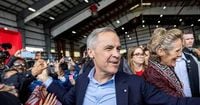Canadian voters are heading to the polls on April 28, 2025, in what is shaping up to be one of the most dramatic elections in recent history. With early voting breaking records—over 7.3 million ballots cast—there’s a palpable sense of urgency in the air. Just a few months ago, polls indicated that the Conservative party, led by Pierre Poilievre, was poised for a certain victory. However, a significant shift has occurred, with the Liberal party, now led by Mark Carney, gaining momentum and flipping the race on its head.
According to Frank Graves, president and founder of Canadian polling firm EKOS Research, “It’s pretty clear the Liberals are going to win this now.” This statement comes on the heels of a tumultuous political landscape that has seen Prime Minister Justin Trudeau step down on January 6, 2025, paving the way for Carney's leadership. The backdrop to this election is marked by the re-election of U.S. President Donald Trump, whose administration has threatened Canada with a trade war, implementing a 25 percent tariff on Canadian imports.
Trump’s tariffs have sent shockwaves through the Canadian economy, where over 70 percent of exports go to the U.S. Economists warn that there could be a major recession in Canada as a result of these policies. Sylvanus Kwaku Afesorgbor, an associate professor at the University of Guelph, noted, “We are very dependent on the US. There could be a major economic recession in Canada because our economy depends largely on the US economy.”
The impact of these tariffs was starkly illustrated in March when Algoma Steel, the second-largest steel producer in Canada, announced layoffs due to the tariffs imposed by Trump. Such economic pressures have forced voters to consider which party can best navigate the turbulent waters ahead.
As the election approaches, Carney has positioned himself as the candidate capable of steering Canada through this crisis. His leadership has been characterized by a call for national unity amidst the rising tide of populism, which has gained traction in both Canada and the U.S. Graves highlighted that 34 percent of Canadians have a populist outlook, reflecting a broader trend that has influenced political sentiments across North America.
The political landscape has shifted dramatically since February, when Poilievre held a commanding 25-point lead over the Liberals. However, as early March unfolded, the Liberals surged ahead, buoyed by a wave of Canadian nationalism in response to Trump’s rhetoric. Political science professor Lisa Young remarked, “That has essentially shifted the terrain politically, because a substantial proportion of the electorate is suspicious of [Poilievre] being too similar to Trump.”
On the campaign trail, Carney has appealed to Canadian identity, emphasizing the need for sovereignty in the face of external threats. He stated, “We are in the equivalent of Game 7 of the Stanley Cup in the last two minutes,” drawing on the nation’s love for hockey to rally support. His message resonates particularly with older voters who are wary of Poilievre’s alignment with Trump.
Meanwhile, Poilievre has sought to capitalize on the desire for change, promising to reduce spending on foreign aid and eliminate a federal sales tax on Canadian-made automobiles as long as U.S. tariffs remain in place. His campaign has found traction among younger voters, particularly young men eager for a shift from nearly a decade of Liberal governance.
In a tragic twist, the final days of the campaign were marred by a horrific incident in Vancouver, where at least 11 people were killed when a vehicle drove through a crowd at a Filipino community festival. Carney briefly paused his campaign but later resumed, emphasizing the resilience of Canadians in the face of adversity. Poilievre also acknowledged the tragedy, noting the significant loss experienced by the Filipino community.
The election is not just a referendum on the parties but also on Canadian identity itself. Many voters, including those living abroad, feel a deep sense of responsibility to protect their national sovereignty against perceived threats from the U.S. Sarah Helppi, a Toronto native living in London, expressed her resolve to vote, stating, “If you mess with Canadians, we’ll hit back.” This sentiment reflects a broader determination among Canadians to assert their identity and values.
As the election day draws near, the dynamics of the race continue to evolve. A recent Nanos poll indicated that the Liberals hold a narrow lead with 43 percent support compared to 38.9 percent for the Conservatives, a shift that could translate into a Liberal victory due to their concentrated support in urban areas.
Voter turnout is expected to be high, with a record number of early ballots cast compared to previous elections. The urgency of the current political climate, coupled with the economic uncertainty stemming from U.S. policies, has galvanized Canadians to make their voices heard.
As Canadians prepare to cast their votes, the stakes have never been higher. The outcome of this election could not only reshape the political landscape in Canada but also send a powerful message to the U.S. and the world about the country’s commitment to sovereignty and democratic values. As Graves succinctly put it, “Canadians are asking, ‘What kind of country do we want to be?’”





